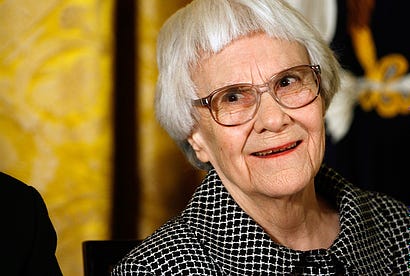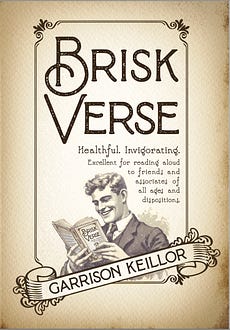|
 |
The Writer's Almanac from Sunday, April 28, 2013
"A Sighting" by Connie Wanek, from On Speaking Terms. © Copper Canyon Press, 2010.
ORIGINAL TEXT AND AUDIO - 2013
It's the birthday of novelist Harper Lee, born Nelle Harper Lee in Monroeville, Alabama (1926). She has written just one novel, To Kill A Mockingbird (1960), but it has sold more than 30 million copies. She hates interviews and speeches, and prefers to live quietly in Monroeville, where she is known as Miss Nelle.
She wrote: "I arrived in the first grade, literate, with a curious cultural assimilation of American history, romance, the Rover Boys, Rapunzel, and The Mobile Press. Early signs of genius? Far from it. Reading was an accomplishment I shared with several local contemporaries. Why this endemic precocity? Because in my hometown, a remote village in the early 1930s, youngsters had little to do but read. A movie? Not often — movies weren't for small children. A park for games? Not a hope. We're talking unpaved streets here, and the Depression. [...] Now, 75 years later in an abundant society where people have laptops, cell phones, iPods, and minds like empty rooms, I still plod along with books. Instant information is not for me. I prefer to search library stacks because when I work to learn something, I remember it."
It's the birthday of chef and author Alice Waters, born in Chatham, New Jersey (1944). She was 27 years old with no restaurant experience when she opened Chez Panisse, her Berkeley restaurant centered on fresh, local ingredients. She wanted to create food like that she had experienced in France, where friends sat down together for long meals prepared by generous hosts. But at first, she was a little too generous — in the first year of its operation, Chez Panisse gave away $30,000 worth of wine to guests and staff.
Waters has written 11 books, including her most recent, In the Green Kitchen: Techniques to Learn by Heart (2007). She wrote: "Our full humanity is contingent on our hospitality; we can be complete only when we are giving something away; when we sit at the table and pass the peas to the person next to us we see that person in a whole new way."
It's the birthday of playwright Robert Anderson, born in New York City (1917). His father, a business executive, was a distant man, and sent his son off to boarding school at Phillips Exeter Academy. Anderson was lonely there, and he fell in love with an older woman. He went to Harvard, fought in the Navy, and then started writing plays.
He thought back to his time at Exeter, and he wrote a play about a lonely and sensitive young man named Tom at an all-boys boarding school. Tom's classmates decide that he is gay and make his life miserable. His one friend is Laura, the wife of a faculty member, who is supposed to offer him tea and sympathy but ends up sleeping with Tom. The play was called Tea and Sympathy (1953), and it was a big hit on Broadway, and then turned into a popular film.
Anderson's other plays include You Know I Can't Hear You When the Water's Running (1967) and I Never Sang for My Father (1968).
He said: "The mission of the playwright is to look in his heart and write, to write whatever concerns him at the moment; to write with passion and conviction. Of course the measure of the man will be the measure of the play."
It's the birthday of poet Carolyn Forché, born in Detroit (1950). In 1978, Forché went to El Salvador, and a year later, the country erupted into a civil war. Forché traveled around the country, meeting revolutionaries and military leaders, documenting the suffering she saw everywhere. She returned to the United States and tried to publish her new poems about El Salvador, but publishers refused. They didn't want political poems. Some agreed to publish the collection if she would tone her poems down, or include ones less political to balance them out. She said: "I thought of the work I was doing as a matter of ethics rather than politics as I understood it, and the purpose of my poetry was poetry." Finally, with the help of novelist Margaret Atwood, Forché found a publisher, and her book The Country Between Us (1981) was a best-seller. She has written just two books of poetry since then: The Angel of History (1994) and Blue Hour (2003).
She said: "No one is a great poet because she is a miserable drunk. No one is a great poet because he has had a nervous breakdown. Suffering, however, can be experienced as a curse or a blessing; the luckiest is the one who can experience it as a blessing."
Be well, do good work, and keep in touch.®
BRISK VERSEby Garrison Keillor, a collection of original invigorating verse. Read it to yourself or aloud to friends, family, or passersby.
First Edition copies autographed/inscribed by the author are available if ordered before May 15. Deadline to order is 11:59 pm on May 15, 2024. Shipping will begin after May 30, 2024.
View draft history
If you are a paid subscriber to The Writer's Almanac with Garrison Keillor, thank you! Your financial support is used to maintain these newsletters, websites, and archive. If you’re not yet a paid subscriber and would like to become one, support can be made through our garrisonkeillor.com store, by check to Prairie Home Productions, P.O. Box 2090, Minneapolis, MN 55402, or by clicking the SUBSCRIBE button. This financial support is not tax deductible.


